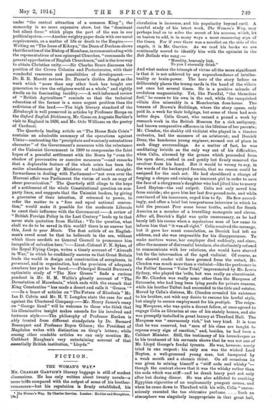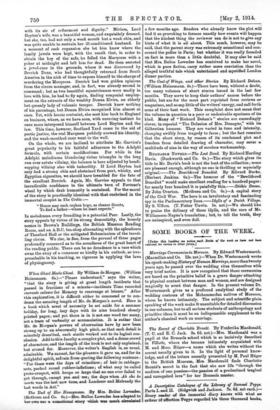FICTION.
THE WOMAN'S WAY.*
Mu. CHARLES astrvice's literary baggage is still of modest dimensions. He has only written about twenty novels—a mere trifle compared with the output of some of his brother- romancers—but his reputation is firmly established, his `1.• Vu Woman's Way. By Charles Garden. London: Hodder and Stoughton. 6al circulation is immense, and his popularity beyond cavil. A careful study of his latest work, The Woman's Way, may perhaps lead us to solve the secret of his success, which, let us hasten to add, is in many ways a most reassuring sign of the times. For if ever there was a novelist on the side of the angels, it is Mr. Garvice. As we read his books we are continually moved to identify him with the optimist in the Bab Ballads who sang :— "Morality, heavenly link,
To you I eternally drink."
And what makes the triumph of virtue all the more significant is that it is not achieved by any superabundance of intellec- tuality or brain-power. The hero of the story before us deliberately places the trump cards in the hand of the villain not once but several times. He is a positive miracle of credulous magnanimity. Yet, like Parsifal, "the blameless fool," he comes to his own in the end, while the vanquished villain dies miserably in a Manchurian doss-house. The tenants of Brown's Buildings, where the story opens, only paid 5s. a week for their lodgings, but some of them had seen better days. Celia Grant, who earned a pound a week by research work in the British Museum for a rich antiquary, had known comparative affluence in the lifetime of her parents; Mr. Clendon, the shabby old violinist who played in a theatre orchestra, had the manners of an aristocrat ; and Derrick Dene, the handsome young engineer, seemed out of place in such dingy surroundings. As a matter of fact, he was meditating 'suicide as the only way out of his difficulties, when Celia, alarmed by, the groans which proceeded from his open door, rushed in and gently but firmly removed the revolver from his hand. But it would be wrong to say, in the words of the hackneyed formula, that no reason could be assigned for the rash act. He bad shouldered a charge of forging a cheque and ruining an innocent girl in order to save the face of a clergyman's daughter who had jilted him to marry Lord Heyton—the real culprit. Celia not only saved him from suicide ; she gave him her lust five-ponnd-note, and while convinced of his innocence, urged him to fly. He flew accord- ingly, and after a brief but tempestuous interview in which be told the peccant Peer some home truths, sailed for South America as a member of a travelling menagerie and circus. After all, Derrick's flight was quite unnecessary, as he had barely left his rooms when a mysterious man of law came to inform him that " it was all right." Celia received the message, but it gave her scant consolation, as Derrick had left no address, and she was responsible for his disappearance. To make matters worse, her employer died suddenly, and since, after the manner of distressful heroines, she obstinately refused to communicate with her relations, she would have starved but for the intervention of the aged violinist. Of course, as the shrewd reader will have guessed from the outset, Mr. Clendon was much more than a violinist—like the performer in the Follies' famous " Voice Trial," impersonated by Mr. Lewis Sydney, who played the 'cello, but was really an elocutionist. So Mr. Clendon was really none other than the Marquess of Sutcombe, who had long been lying perdu for private reasons, while his brother Talbot, had succeeded to the title and estates. Moved by Celia's distress, Mr. Clendon revealed his existence to his brother, not with any desire to resume his lawful style, but simply to secure employment for his protegee. The reign- ing Marquess, who was quite a decent fellow, at once agreed to engage Celia as librarian at one of his stately homes, and she was promptly installed in great luxury at Thexford Hall. The Marquess was " enormously rich," but very kind. It is true that he was reserved, but "men of his class are taught to repress every sign of emotion," and, besides, he bud been a Cabinet Minister. Still, the testimony of his housekeeper as to his treatment of his servants shows that he was not one of Mr. Lloyd George's feudal tyrants. He was, however, sorely tried in one respect : his only eon was the wicked Lord Heyton, a well-groomed young man, but hampered by a weak month and a chronic thirst. On all occasions he was given to mixing himself a "stiff soda and whisky "— though the context shows that it was the whisky rather than the soda which was stiff—and be drank heavy port not only after but during dinner. He was also addicted to smoking Egyptian cigarettes of an unpleasantly pungent aroma, and when he came down to Thexford with his wife, Celia "
uncon- sciously resented the too obtrusive perfume. . . . Such an atmosphere was singularly inappropriate in that great ball, with its air of refinement and dignity." Miriam, Lord Heyton's wife, was a beautiful woman, and exquisitely dressed, but she, too, had not only a weak mouth but a weak chin, and was quite unable to restrain her ill-conditioned husband. In a moment of rash expansion she let him know where the family jewels were kept, with the result that, in order to obtain the key of the safe, he felled the Marquess with a poker at midnight and left him for dead. He then secreted a jewel-case in the grounds, where it was discovered by Derrick Dens, who had thoughtfully returned from South America in the nick of time to expose himself to the charge of murdering the Marquess. Derrick had won golden opinions from the circus manager, and, in fact, was already second in command ; but as two beautiful equestriennes were madly in love with him, he had to fly again, finding congenial employ- ment on the estancia of the wealthy Donna Elvira, an elderly but queenly lady of volcanic temper. Derrick knew nothing of his parentage, but Donna Elvira recognized him almost at once. Yet, with heroic restraint, she sent him back to England on business, where, as we have seen, with unerring instinct he once more interposed himself between Lord Heyton and the law. This time, however, Scotland Yard came to the aid of poetic justice, the real Marquees publicly avowed his identity, and the weak-mouthed ones went to the wall.
On the whole, we are inclined to attribute Mr. Garvice's great popularity to his faithful adherence to the Adelphi formula, with certain modifications. For while in the Adelphi melodrama blundering virtue triumphs in the long run over astute villainy, the balance is here adjusted by handi- capping villainy also with imbecility. If Lord Heyton had only had a strong chin and abstained from port, whisky, and Egyptian cigarettes, we should have trembled for the fate of the excellent Derrick. Again, Mr. Garvice appeals to that ineradicable confidence in the ultimate turn of Fortune's wheel by which drab humanity is sustained. For the moral of the story is practically identical with that enshrined in the immortal couplet in The Critic
"Hence may each orphan hope, as chance directs, To find a father—where he least expects."
In melodrama every foundling is a potential Peer. Lastly, the story appeals by virtue of its strong domesticity, the homely scenes in Brown's Buildings, the British Museum Reading Room, and an A-B.C. tea-shop alternating with the splendours of Thexford Hall or the mitigated Bohemianiem of the travel- ling circus. We rise, in fine, from the perusal of these pages profoundly reassured as to the soundness of the great heart of the reading public. There can be no decadence in a race which owns the sway of a romancer so kindly in his outlook, so irre- proachable in his teaching, so rigorous in applying the laws of physiognomy.















































 Previous page
Previous page